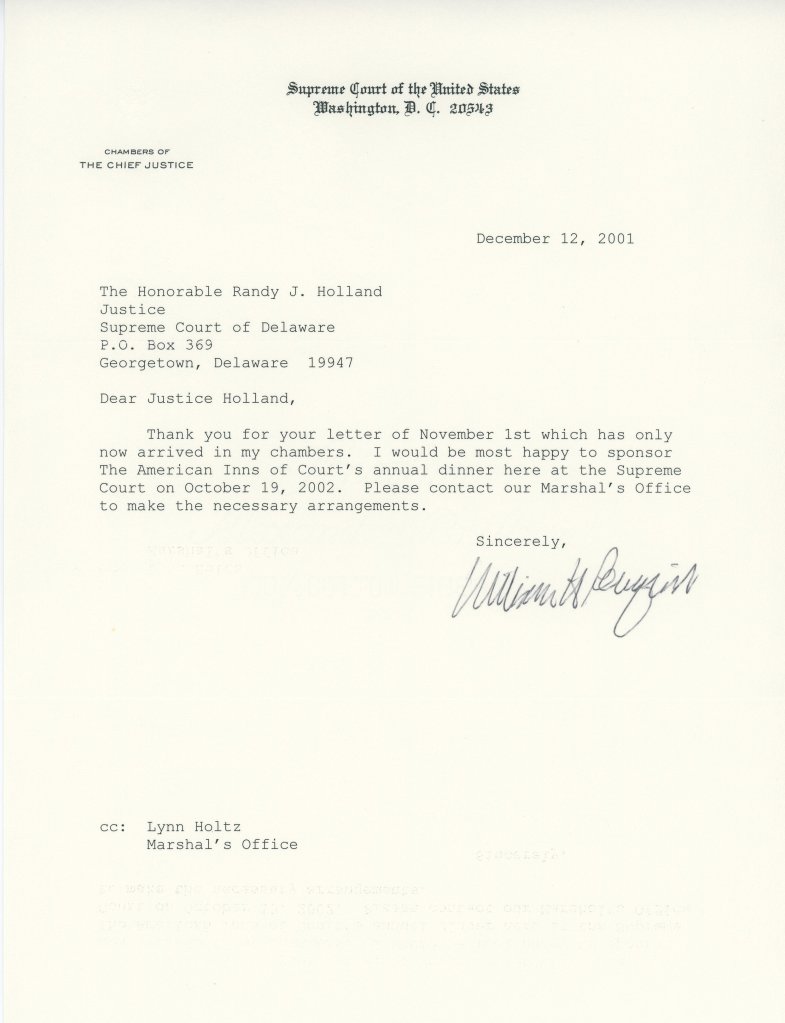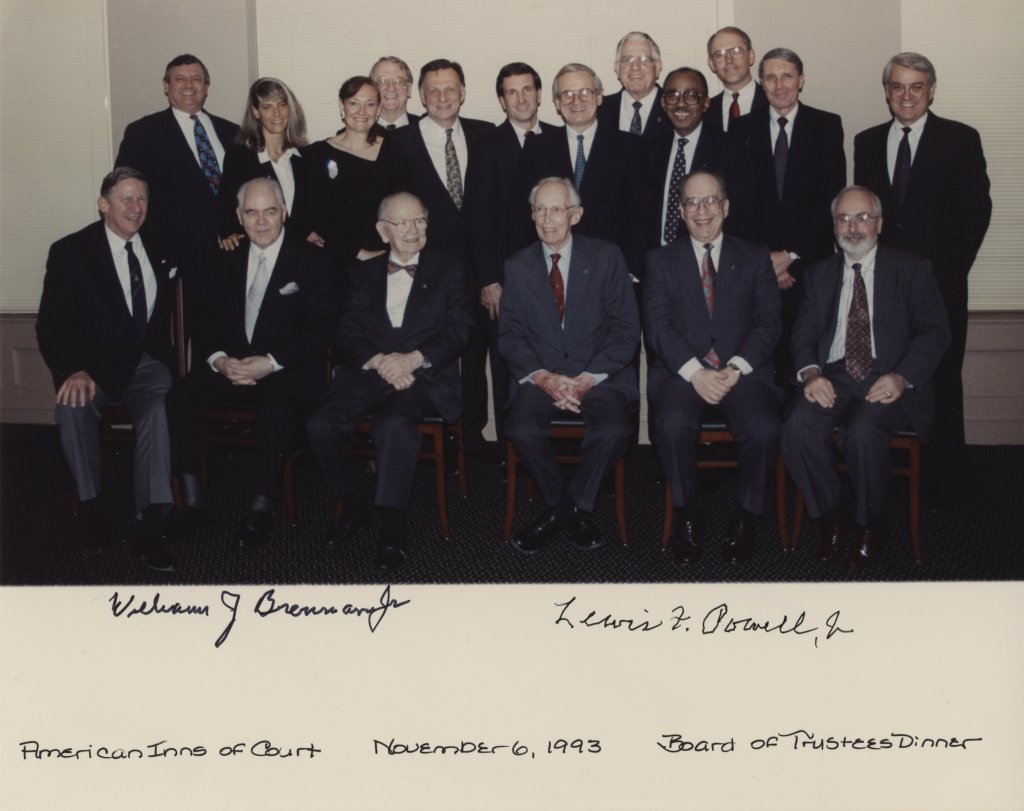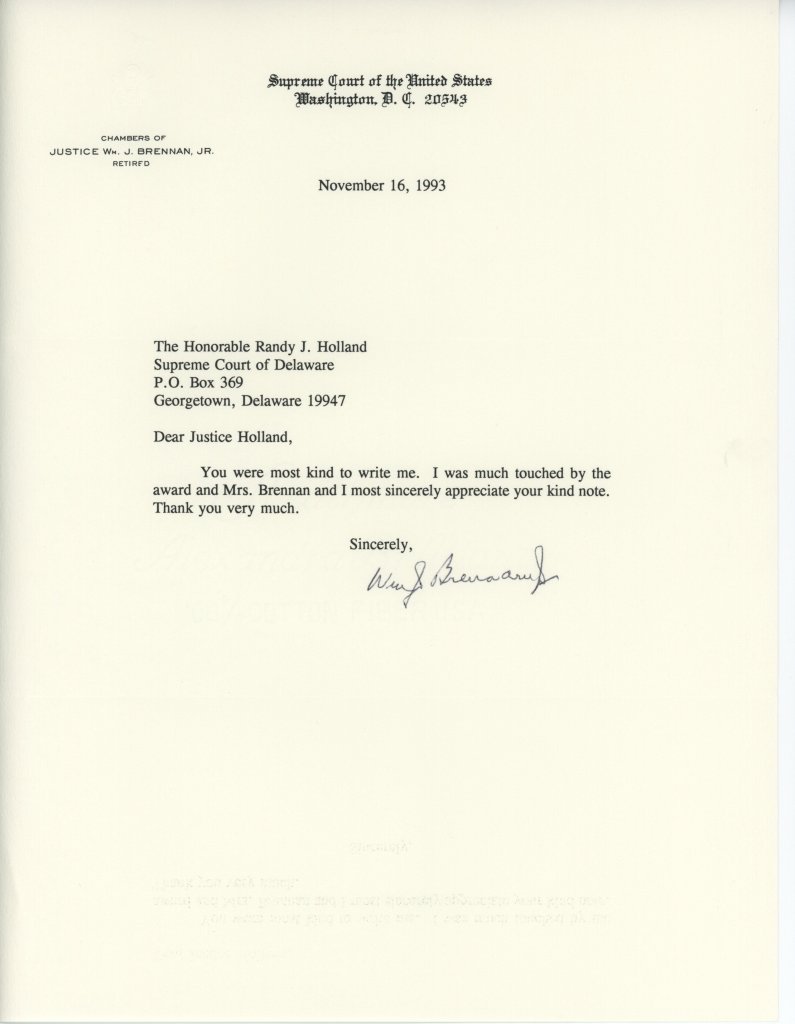-
Justice Randy Holland with Justice Ruth Bader Ginsburg and Justice John Paul Stevens

 Categories: Uncategorized
Categories: Uncategorized -
Letter from Chief Justice William Rehnquist to Justice Randy J. Holland: November 22, 2024

CHAMBERS OF THE CHIEF JUSTICE
Supreme Court of the United States
Washington, D. C. 20543November 22, 2004
Honorable Randy J. Holland
Associate Justice of
the Supreme Court of Delaware
34 The Circle
Georgetown, DE 19947Dear Justice Holland:
I am pleased to learn from Ralph Mecham that you have agreed to serve as a member of the Judicial Conference Advisory Committee on Appellate Rules, and I hereby appoint you to the Committee, effective immediately. Your term will expire on October 1, 2007. Judge Samuel A. Alito, Jr. of the United States Court of Appeals for the Third Circuit chairs the Committee, and you will hear from him shortly regarding the Committee’s procedures and forthcoming schedule.
I am confident that your contributions will be many. Your willingness to serve over and above the performance of your regular professional duties demonstrates your commitment to an effective judicial system, for which I am grateful.
I will appreciate your formal acceptance of this appointment at your earliest convenience.
With best regards.
Sincerely,
William RehnquistCC:
Honorable Anthony J. Scirica
Honorable Thomas I. Vanaskie
Honorable Samuel A. Alito, Jr.
Mr. Leonidas Ralph MechamCategories: William Rehnquist -
Letter from Chief Justice William Rehnquist to Justice Randy J. Holland: December 12, 2001

CHAMBERS OF THE CHIEF JUSTICE
Supreme Court of the United States
Washington, D. C. 20543December 12, 2001
The Honorable Randy J. Holland
Justice
Supreme Court of Delaware
P.O. Box 369
Georgetown, Delaware 19947Dear Justice Holland,
Thank you for your letter of November 1st which has only now arrived in my chambers. I would be most happy to sponsor The American Inns of Court’s annual dinner here at the Supreme Court on October 19, 2002. Please contact our Marshal’s Office to make the necessary arrangements.
Sincerely,
William RehnquistCC:
Lynn Holtz
Marshal’s OfficeCategories: William Rehnquist -
Letter from Chief Justice William Rehnquist to Justice Randy J. Holland: November 21, 2000

CHAMBERS OF THE CHIEF JUSTICE
Supreme Court of the United States
Washington, D. C. 20543November 21, 2000
The Honorable Randy J. Holland
Supreme Court of Delaware
P.O. Box 369
Georgetown, Delaware 19947Dear Justice Holland,
Thank you for your letter of November 15th, inviting me to attend the American Inns of Court dinner and awards presentation to be held in October 2002. As you may imagine, I receive a number of requests such as yours and I have adopted a firm policy of not committing myself to anything more than a year in advance. Should you wish to renew your invitation closer to the date I would be happy to consider it.
Sincerely,
William RehnquistCategories: William Rehnquist -
Signed photo by Justices William Brennan and Lewis – Powell Inns of Court Dinner November 6, 1993

Signed photo by Justices William Brennan and Lewis Powell
American Inns of Court Board of Trustees Dinner
NOVEMBER 6, 1993
Lots of my dad’s friends in this one – loved and familiar faces.EDIT: Thanks for the help everyone!
back row (left to right) – Mike Coffield, Joryn Jenkins, [?], [?]. Hal Braff, Justice Holland, Jim George, Albert Moon from Hawaii, [?]. Ralph Dewsnup, Don Stumbaugh (Executive Director), Judge Patrick Higginbotham.
front row (left to right) [?]. Judge Howard Markey, Justice Brennan, Justice Powell, Prof. Sherman Cohn, and Peter Murphy
Categories: Uncategorized -
Letter from Justice William Brennan to Justice Randy J. Holland: November 16, 1993

CHAMBERS OF JUSTICE WM. J. BRENNAN, JR.
RETIRED
Supreme Court of the United States
Washington, D. C. 20543November 16, 1993
The Honorable Randy J. Holland
Supreme Court of Delaware P.O. Box 369
Georgetown, Delaware 19947Dear Justice Holland,
You were most kind to write me. I was much touched by the award and Mrs. Brennan and I most sincerely appreciate your kind note. Thank you very much.
Sincerely,
William J. BrennanCategories: William Brennan -
Justice Randy Holland’s copy of the United States Constitution signed by Chief Justice Warren Burger
 Categories: Warren Burger
Categories: Warren Burger -
Letter from Chief Justice Warren Burger to Justice Randy J. Holland: January 15, 1992

CHAMBERS OF CHIEF JUSTICE BURGER RETIRED
Supreme Court of the United States
Washington, D. C. 20543June 15, 1992
RECEIVED
JUN 18 1992
RJHDear Randy:
I am delighted to know that you have been elected to the Board of Trustees of the American Inns of Court Foundation and that you will be a member of the Professional Standards Committee. I have been profoundly concerned that there seems to be too much concern for more and more chapters at the expense of the strong statement in the Creed of Ethics on the subject of advertising and solicitation by lawyers. This overlooks the really basic reason why the American Inns of Court was started that is to have as near as possible the standards that guide the British barristers. My friends from the Middle Temple and the other Inns are appalled when they come to this country and see the advertising.If you find you are going to be in Washington at some point please let me know in advance. I would like to visit with you about this.
Sincerely,
Warren E. BurgerHonorable Randy J. Holland
Supreme Court of Delaware
208 Courthouse
P.O. Box 229
Georgetown, Delaware 19947Categories: Warren Burger -
Fax forwarded from Chief Justice Warren Burger to Justice Randy J. Holland: January 21, 1993

’93 01/20 16:27
From: The Right Honourable The Lord Bridge of Harwich
HOUSE OF LORDS
Sent by Fax20 January 1993
My dear Warren,
Many thanks for your letter. I was delighted to hear from you.
By the same post as your own letter I also received one from Professor Sherman Cohn similarly on the subject of Justice Holland’s intended visit to London. I understand that the dates when Justice Holland will be here are 28-30th January. Unfortunately I am not, myself, able to be available on those dates to look after Justice Holland or to show him our system at work. But I have been in touch with Sir Thomas Legg (https://en.wikipedia.org/wiki/Thomas_Legg), the Permanent Secretary of the Lord Chancellor’s Department, whom you met when we were both in Washington in 1989 in the course of the Anglo-American Legal Exchange. Tom has very kindly said that he will try to arrange a suitable programme for Justice Holland to visit the Royal Courts of Justice and one or two of our Inns of Court here in London on Thursday and Friday, 28th and 29th January. Will you please ask Justice Holland to get in touch on his arrival with Thomas Legg’s office, telephone no: 071-219 3246.I hope you and Vera are both well and that you are still enjoying your splendid work as Chairman of the Bi-Centennial Commission. I shall much look forward to receiving the Commission’s publications which you have so kindly sent me under separate cover.
Margaret joins me in sending our warmest regards and best wishes to you both.
Yours most sincerely,
NigelHis Hon. Chief Justice Burger Supreme Court of the United States Washington DC 20543
U.S.A.
Fax No. (202) 479 2971
02Categories: Warren Burger -
Note from Chief Justice Warren Burger to Justice Randy J. Holland: January 21, 1993

Supreme Court of the United States
MemorandumJanuary 21, 1993
Justice Holland:
Chief Justice Burger asked
me to send you a copy of this
fax message which he recently
received.Katy Idoni
SecretaryCategories: Warren Burger
-
Subscribe
Subscribed
Already have a WordPress.com account? Log in now.